Terry had always aspired to make something of her life, and on December 26th, 1968, she became the first woman in her family to join the Navy. In doing so, she also followed in the footsteps of her father and two uncles, who had all served time in the Navy before her. She graduated high school and worked at a local drugstore for nearly a year before enlisting; she joined with the intention of continuing her education and becoming career military personnel. Terry was trained as a Hospital Corpsman at the Naval Hospital Corps School in Great Lakes, Illinois, and aspired to serve directly on the ground in Vietnam. Though it was not her lot to be sent overseas, her wish to directly aid the men and women serving in this conflict was granted.
Terry was stationed at the Naval Hospital in Jacksonville, Florida, where she would care for soldiers who were wounded in battle. Though she was not overseas, Terry found her work as a Hospital Corpsman to be incredibly fulfilling. She worked in units dedicated to surgical and medical intensive care, tending to the dependent and wounded. When working at the Naval Hospital, she strived every day to provide exceptional care to the men and women arriving back from Vietnam in critical condition; Terry is especially proud of the part she played in the care of other women service members and was particularly touched by her experience of caring for an admiral, a high-ranking women veteran, who trusted Terry so much she requested her by name.
Terry is incredibly grateful for every chance the Navy has given her to meet such inspiring people and experience new things. She believes that had she remained in her hometown of Neenah, she would never have been able to experience such wonderful things in her life, and to lead such a phenomenal life during her twilight years at King; Terry firmly believes that the Navy and her life as a service women has made this all possible.
Shirley Wade, U.S. Air Force Veteran
Military Photographer
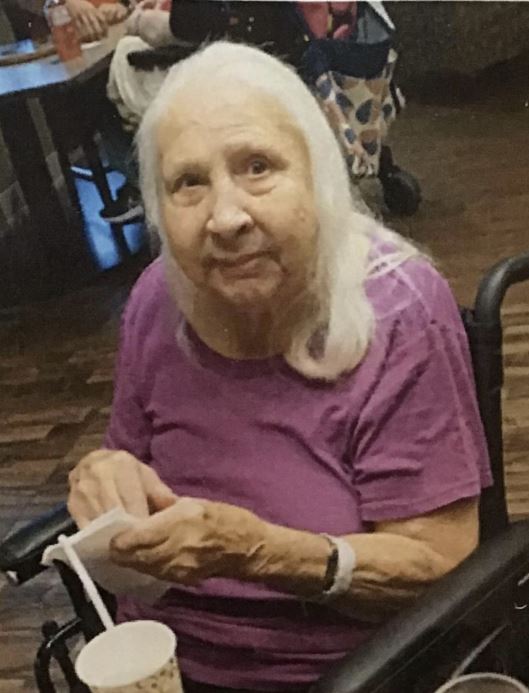
Shirley was born into a proud military family. Her father, uncles, and cousins had all served in one branch or another. When Shirley became the first woman in her family to serve in the military, she saw it as no special feat; she was simply fulfilling her patriotic duty. Shirley graduated high school and wasted no time in joining up, and on August 29th, 1955, she enlisted in the Air Force. Soon thereafter, Shirley left her hometown of Appleton, Wisconsin to complete her basic training, and in short succession, she would move on to continue her military training in Denver, Colorado. Shirley had decided to work as a photography lab technician for the Air Force, and her training in Denver taught her the ropes of photography, film, and developing images.
During her time in the Air Force, Shirley served as a trusted service member and participated in the documentation of highly sensitive information. Throughout much of her service, Shirley was stationed at the Offutt Air Force Base in Bellevue, Nebraska. In Bellevue, she would conduct most of her work four stories underground and would move mountains of film through the photography lab on any given day. Shirley also served as a photographer throughout her service and fondly remembers an assignment she received to take pictures of pastoral churches scattered across the countryside of Nebraska. Throughout her career in the Air Force , Shirley was strengthened by the support of her husband, and after nearly two productive years of service, she decided to be discharged for the benefit of her young family.
Though life was equally busy at home with five children, Shirley continued to pursue photography as a recreation in her downtime. Shirley is proud of her own service and of having raised two sons who served.
Sally Olson, U.S. Army Veteran
Army Medic
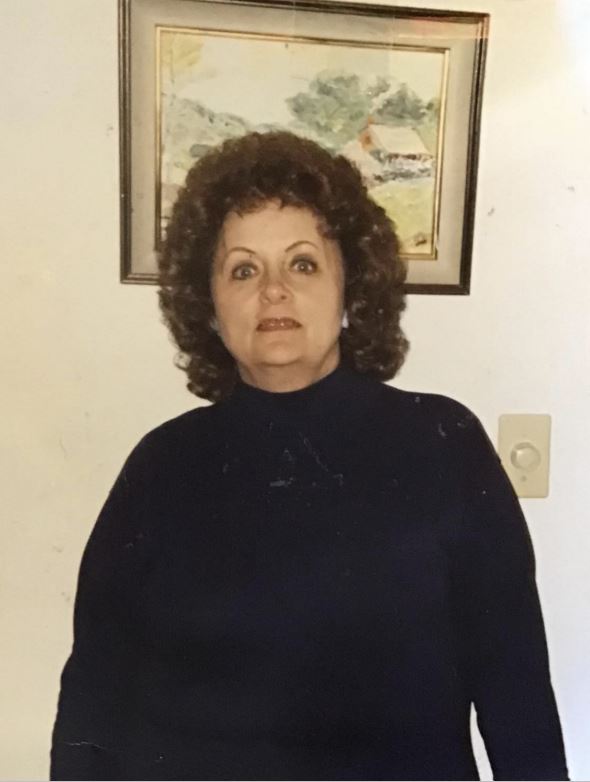
Sally was born into a military family; her father was a proud member of the U.S. Army and Military Police. On October 14th, 1958, she enlisted under the same branch as her father, who was so pleased with his daughter's decision that he helped Sally submit her paperwork. On the same day she graduated high school, Sally boarded a train and arrived in Fort McClellan, Alabama, to complete her basic training. Sally served in the U.S. Army for three years during peacetime and continued training as an Army Medic until her discharge. During this time, Sally was constantly on the go. She transferred between multiple duty stations, forts, and military hospitals. Here, she undertook continuous medical training in preparation for any impending conflict. When stationed in San Francisco,
Sally worked on an Iron Lung unit caring for victims of polio. As a peacetime veteran, Sally also became accustomed to marching in parades with her fellow service members as a representative of her branch and unit; she liked marching in tandem with the other women and parading for higher-ranking military officials who were often watching from the audience. Sally is proud of the time she spent as an Army woman and felt incredibly fulfilled in the work she accomplished before her discharge.
After leaving the military, Sally continued caring for the sick and injured. Her military training carried over into the civilian sector and she found employment as a nurse at Lakeland Hospital in Elkhorn, Wisconsin. As a civilian nurse, the other girls would frequently ask her about her time in the service, her work, and her experiences, and Sally was always proud to tell them all about it.
Margaret Marchetti, Veteran U.S. Army
Medical Technician & Chaplain
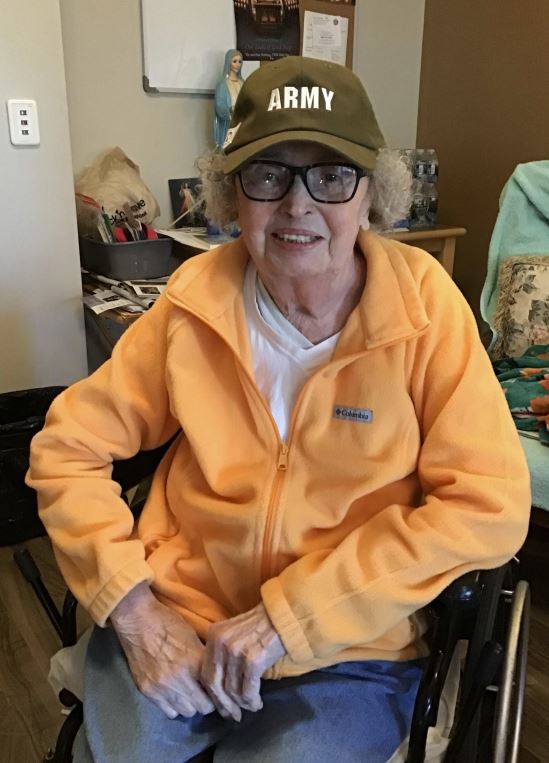 When walking home from her job at the telephone company, Margaret received a sign: an advertisement to join the Army and further her education. At the time, women needed to be twenty-one to join the Armed Forces, and Margaret was just two days short of her twenty-first birthday; she needed her parents' consent. Her father was concerned, but he gave his signature of approval, and Margaret was allowed to enlist on August 23, 1956. Margaret completed her basic training at Fort McLellan, where she braved the heat of Alabama's relentless Summer. Unfazed by this experience, Margaret remained in the South and reported to her first duty station in El Paso, Texas. Margaret worked as a medical technician at Willaim Beaumont Army Hospital.
When walking home from her job at the telephone company, Margaret received a sign: an advertisement to join the Army and further her education. At the time, women needed to be twenty-one to join the Armed Forces, and Margaret was just two days short of her twenty-first birthday; she needed her parents' consent. Her father was concerned, but he gave his signature of approval, and Margaret was allowed to enlist on August 23, 1956. Margaret completed her basic training at Fort McLellan, where she braved the heat of Alabama's relentless Summer. Unfazed by this experience, Margaret remained in the South and reported to her first duty station in El Paso, Texas. Margaret worked as a medical technician at Willaim Beaumont Army Hospital.
As a medical technician, Margaret worked in the hospital laboratory. She collected samples from Army Hospital patients and performed tests to aid doctors in diagnosing them. While stationed in El Paso, she met her husband, Vincent Marchetti. He was a biochemist and a fellow service member. Margaret and Vincent would marry on the same grounds as where they had first met, in the modest Catholic chapel of William Beaumont Army Hospital.
After nearly three years of service as a medical technician, Margaret discharged from the Army to work in the civilian sector. She was incredibly successful in her post-military career as a medical lab specialist, and her husband would go on to serve in the Korean War. The young family would reunite when Vincent was assigned to a duty station in Korea, and on their leave, they would tour the European countryside together. Altogether, the family visited seventeen different countries, and were enriched in the experiences they shared as a military family.
Lisa Liepert, Veteran U.S. Army
Helicopter Mechanic
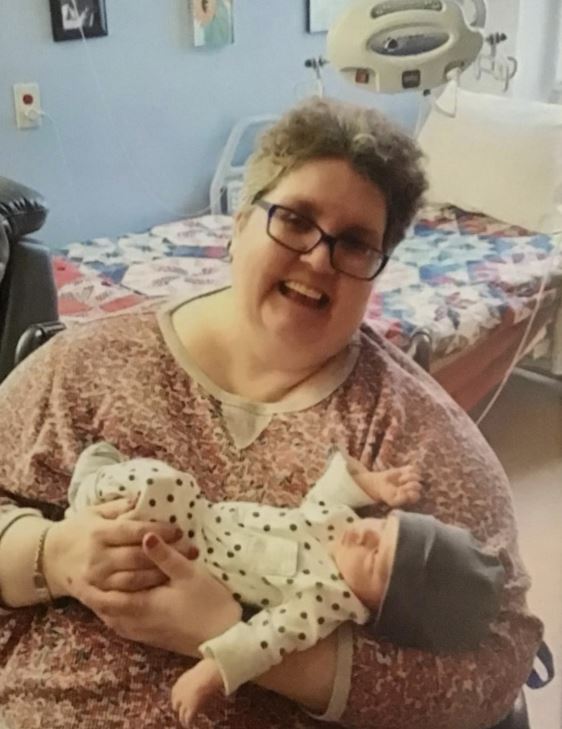
Lisa is a farmer's daughter through and through. After spending five years at Concordia University, she concluded that the field of nursing didn't quite agree with her and told her mother she wouldn't need to pay any more tuition; she was joining the Army. At first, Lisa's mother was concerned for her daughter's safety, but was proud once Lisa reported she would be training as a helicopter mechanic. As a rookie, Lisa learned she excelled in things many other mechanics couldn't accomplish.
Lisa discovered she had a mechanical gift that few of her male colleagues could imitate; her smaller fingers and finer dexterity made her better suited to perform the tasks of a mechanic in the confined spaces they often needed to tinker in. Though her repair duties frequently left her greasy and grimy, she was proud to wear her work on her sleeve. She graduated from mechanic's school with honors and would go on to become a crew chief; she provided essential oversight in the functioning and airworthiness of military helicopters.
Eventually, Lisa was given the opportunity to continue her service in Germany, but she was hesitant. She had never been to Germany before and would need to switch roles. After some encouragement from her mother, Lisa decided to seize hold of this adventure; she would work as a typist for a colonel and sergeant major and would always take the time to delight her family with pictures of her new duty station. Shortly after moving to Germany, she would meet her husband. By pure chance, he was a fellow Wisconsinite who had lived in Keel, Wisconsin, only several miles away from where Lisa had grown up in Grafton. Lisa believes her time in the service greatly impacted her; despite working in aviation, her experiences only brought her further down to earth.
Kathleen White, Veteran U.S. Navy
Boatswains Mate
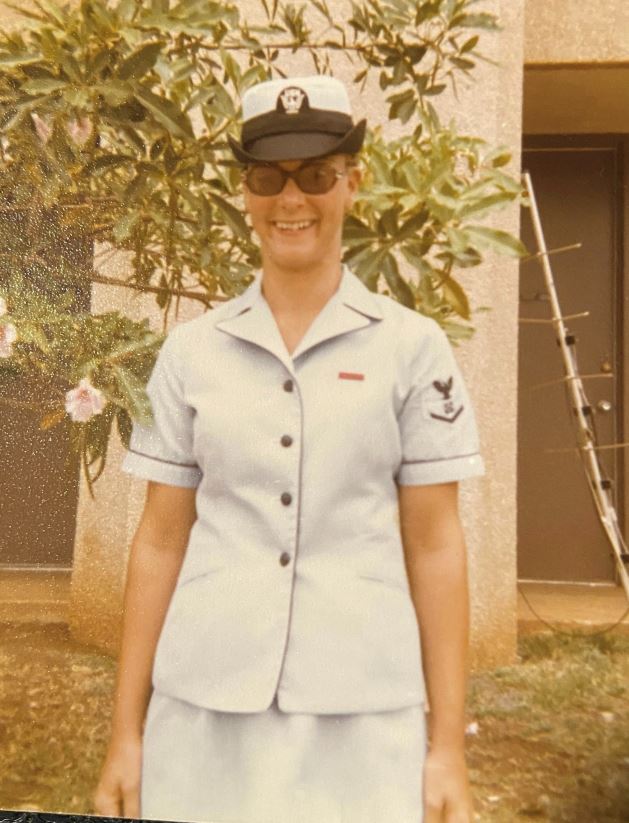
Kathleen joined the U.S. Navy in October 1974, and from the moment she entered boot camp, people were calling her a lifer. After her high school graduation, she joined the service; in only her first five years, she had already seen five different duty stations. She briefly served at a Naval Air Station in Miramar, working in the coffee nest of a VC7 Squadron hangar bay, but would find her life's calling in the Navy doing the work of a Boatswain's Mate when stationed on a tugboat in Long Beach, California. This was not a title women could hold when Kathleen started her career, but she performed the duties of the job exceptionally. When working on the tugboat, Kathleen learned how to do everything her male colleagues could do: she learned how to handle the lines, heave them up to the ship, and splice them. She also maintained the appearance of her tugboat, diligently chipping away old paint and repainting until it outshined the rest of the tugs.
The excellent work of Kathleen and her crew earned their tugboat an award for best overall appearance, and it was marked with a big, white E. After Kathleen's three years were up, she extended to two and transferred to a large naval base in Hawaii, where she spent time working at the Admiral's Boathouse recounting the history of Pearl Harbor and giving tours. Here, Kathleen made Third Class Petty Officer's Boatswain's Mate, an achievement which she and her colleagues celebrated with a Hawaiian Luau.
At her final duty station, she performed search and rescue at a Marine Corps and Air station in Kaneohe Bay. After completing her first five years of service, Kathleen went into the reserves. She returned to her old stomping grounds in Pearl Harbor, where she worked in a library in the reserves center and made E6. Kathleen endeavored through sixteen years of service, and by the end, she achieved two honorable discharges and paved the way for countless other servicewomen who came after her.
Jacqueline King, Veteran U.S. Navy
Avionics Electronics Equipment Repair

Jackie comes from a humble background, and when she decided to join the Navy, she knew her service would never make her rich, but she reasoned she had never been. Jackie simply wanted a stable life that she knew the military would provide. Growing up with little access to food, Jackie was too underweight to enlist, but with the help of her grandmother's cooking, Jackie was finally able to make the weight requirements and enlisted on October 26th, 1981.
Jackie completed her basic training at the Naval Training Center in Orlando, Florida, and traded the hustle of inner-city life in Milwaukee for the tropical scenery of her first duty station: Hawaii. Jackie remembers the time she spent there fondly, but yearned to define her role in the Navy, as she planned to dedicate the next twenty years of her life to the service. One of her best friends in the Navy was an electrician, and he inspired her to begin studying electronic repair.
Jackie eventually decided to specialize in aviation electronics and found her work rewarding; she enjoyed learning about the individual components, their connections, and the mechanisms by which they would unite to form a well-functioning machine. At her first duty station as a fully trained avionics electrician in Reno, Nevada, Jackie's career was cut short by a tragic car accident; though she survived and miraculously awake from her coma, Jackie was unable to continue serving.
Despite her involuntary departure, Jackie still treasures the memories she made during her time in the service. Her training took her all over the country; she spent time with her friends camping out in Tennessee and hiked along the Pacific Coast Highway in California. Jackie has few regrets and would do it all over again.
Carol Keppler, Veteran U.S. Marine Corps
Drill Sergeant
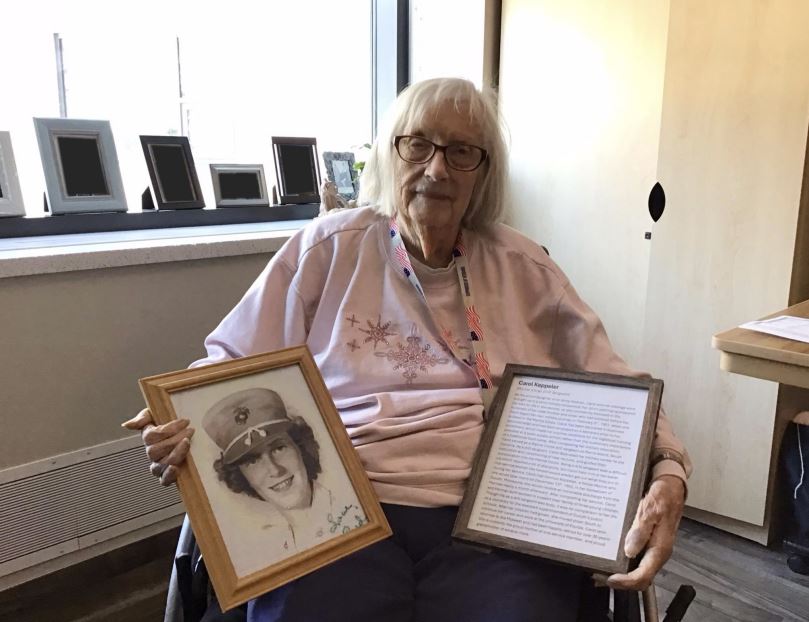
As the proud daughter of an Army Veteran, Carol and her siblings were raised in a strict military household. Her strict upbringing prepared her well for life in the service, as she confidently followed in the footsteps of her older brother and sister, who had enlisted before her.
Carol began her own military journey on February 5th, 1951, when she enlisted in the Marine Corps. Carol had been educated in business administration and had been employed as a secretary prior to her enlistment, which made her a prime candidate for the logistical training provided at a basic supply school rather than the customary experience of a traditional boot camp.
After completing her military education, Carol served as a Marine Corps drill sergeant on Parris Island, South Carolina. As a drill sergeant, Carol dedicated her military career to the instruction and conditioning of new recruits and guided their acculturation into the Marine Corps. Being a drill sergeant was a difficult job that required a lot of discipline, but Carol held firm in her belief that service women like herself would always get out what they put in.
During her service, Carol met Herman Keppeler, a fellow Marine, whom she would later marry on December 13th, 1952, in her hometown of Duluth, Minnesota. Nearly a month afterward, she received an honorable discharge from the Marines. After completing their service, Carol and Herman both worked to support their family of three young children.
Though life as a drill sergeant was busy, it was no comparison to her life as a secretary for the assistant superintendent of Duluth's public schools. After her children had grown, she moved down South to continue her career and work at the University of Florida. Carol later returned to the Midwest and has been happily retired for over 30 years! She is currently the proud mother of one service member and proud grandmother of several more.